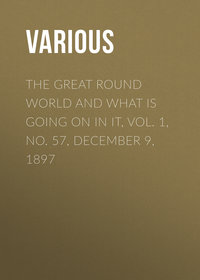Kitabı oku: «The Great Round World and What Is Going On In It, Vol. 1, No. 57, December 9, 1897», sayfa 6
INVENTION AND DISCOVERY
Currycomb and Brush Combined.—This is such a fine article for the comfort of our animal friends that we cannot refrain from telling our young readers about it.
Many of you may have curried a horse, or stood by during the process, and watched him shrug and twitch with pleasure as the little iron teeth scratched his skin, and have seen his coat grow glossy and satiny as the brush was applied as soon as the currying was over.
Now this operation is most delightful to a horse; it is to him what taking a bath is to us; and properly done it makes him feel fresh and vigorous and quite happy to do his master's work.
If it is not well done he feels restless and dirty, and the pores of his skin become clogged, and the good horse gets sick.
Currying a horse is quite hard work, and lazy grooms do not like to do it, and so they have invented a means of shirking the brushing which is very unkind to the horse.
Every owner wishes to see his animals with glossy, shining coats, and so bad grooms, to save the trouble of currying and brushing, will rub the horse over with a cloth, dipped in kerosene. The coat will shine beautifully, but the poor horse is made most uncomfortable.
The currycomb and brush prevents this wicked practice, by making the cleaning of the horse so easy that it is not worth the laziest man's while to oil the horse instead of currying him.
As you will see by the illustration, the currycomb has a dandruff brush attached to its outer edge. As the comb is withdrawn the brush passes over the skin that has been curried, brushes it clean of dandruff, and makes it smooth and glossy. After one good currying with this device the nag is ready for harness, his coat sleek, shiny, and, above all, clean.
You young people who are the happy owners of horses, must always make sure that the gloss on your favorite's coat is the result of health and cleanliness, and not kerosene.
Car-step.—This excellent device is the invention of a young lady of Pittsfield, Illinois.
Every one who has travelled in Pullman cars knows the discomfort of that last step before you reach the ground. It is true that the porter is always waiting with a little wooden stool on which you step from the high car-step above, but for old people or lame people or nervous people there is always the dread that they may miss the little stool, and be tumbled over on the platform.
This invention is to prevent any such difficulty.
The steps of the Pullman cars can only be a certain length, and must not jut out beyond the sides of the car, otherwise they would be liable to be torn off when the oar passes through tunnels or narrow places. It is therefore impossible to have them built any longer than they are at present. The new invention, however, adds a step without going beyond the proper limit.
It is done in this way: The step is made of iron, and is joined to the regular wooden steps by strong rods. When the train is in motion the extra step folds under the car-step. When the train stops the porter touches a lever, and down comes the extra step, making the descent from the car as easy as walking downstairs.
It is a fine invention, and we hope soon to see it used on all Pullman cars.
G.H.R.
BOOK REVIEWS
There has just been published a collection of sketches and essays by Charles Dickens which have hitherto been uncollected and none of which has been reprinted in the United States. This cannot fail to be an extremely interesting book to the great army of admirers of Dickens. His books always bear the unmistakable imprint of the master, novelist's mind—in his fun, satire, and humor going hand in hand, as well as in his sincerity and interest in the poor. Everything that Dickens wrote has upon it the mark of genius, and this book will come as a delight to many.
("Old Lamps for New Ones, and Other Sketches and Essays," by Charles Dickens. The New Amsterdam Book Company: 350 pages, cloth, $1.25.)
PRIZE CONTEST
Owing to the improper character of many of the prize contests which have recently been offered by many papers and to the criticisms which have been called forth by them, we have decided that it is best to withdraw the contest begun in No. 55. We know that these contests are of great interest to our readers, and hope that we shall be able to renew them in the near future without subjecting ourselves to the risk of criticism which so properly attaches to any of the prize contests being published.
